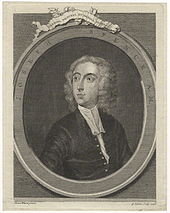Joseph Spence
Joseph Spence (born April 28, 1699 in Kingsclere , † August 20, 1768 in Byfleet ) was an English historian , garden architect and man of letters .
Joseph Spence was the son of the pastor Joseph Spence, the Precentor of Winchester Cathedral and his wife Mirabella, a granddaughter of Thomas Lunsfords . 1709 he moved to the school in Mortimer and then the Eton College . From 1716 to 1720 he attended Winchester College with the private sponsorship of a patroness . In 1720 he received a scholarship from the New College of the University of Oxford , where he was initially a scholar , and in 1722 elected a fellow . In 1724 he received his bachelor's degree and in 1727 his master's degree. He was ordained in 1726. In 1728 Spence was appointed to succeed Thomas Warton the Elder as Oxford Professor of Poetry . He ended the activity after the maximum permitted ten years in the position in 1738 and was succeeded by John Whitfield in the position. Between 1731 and 1741 he toured continental Europe several times, including Italy twice accompanied by English nobles on their Grand Tour . On the recommendation of Alexander Pope , he accompanied Charles Sackville between 1730 and 1733 . With John Morley Trevor he toured the Netherlands, Flanders and France between May 1737 and February 1738, and between September 1739 and November 1741 Italy with Henry Pelham-Clinton . Spence was a member of the Society of Dilettanti at least since 1736. In 1741 he was appointed Regius Professor of Modern History . Here, too, as successor to William Holmes, he was the third holder of the professorship since the establishment, as was the case as Oxford Professor of Poetry . Both professorships still exist today and are extremely reputable. He held the professorship until his death; He was succeeded by John Vivian . When he took over the Regius Professorship, he ended his fellowship at New College and moved to London with his mother. In 1748 he received a house in Byfleet from Henry Pelham-Clinton, Earl of Lincoln . Here he began to work intensively with gardening. In 1754 he was preamble to Durham Cathedral . In 1758 Spence toured Scotland with Robert Dodsley . After suffering a minor heart attack in 1766 , he wrote his will. A year later he sold the rights to his published and unpublished works to James Dodsley for £ 100. In 1768 he died in his garden and was buried in the Marienkirche in Byfleet.
Spence's first significant work is a commentary on Alexander Pope's translation of the Odyssey , which he designed in dialogue form. Through this work a friendship developed between Pope and Spence that lasted lifelong. He was also friends with Robert Lowth , Christopher Pitt , and Edward Young . Spence also chose the dialogue form for his main work Polymetis , which is provided with many engravings based on ancient monuments . The work, strongly influenced by Joseph Addison's Dialogues upos the Usefullness of Ancient Medails , dealt with the visual arts and culture of the Romans . The developments in art and culture are presented in dialogues between the eponymous Polymetis and his friends Philander and Musagetes. By looking at an imaginary collection of ancient statues depicting ancient gods, heroes and personifications, the aim is to show that literature and the visual arts are directly related to and need each other, and that content and modes of representation are directly linked to one another. Thus, both areas can also explain each other. Through Spence's work, a common aesthetic view became a method of scientific interpretation. He gained his ideas for the work mainly on his two trips to Italy. Polymetis was extremely successful. The book was not only reprinted several times, it was also translated into German. Gotthold Ephraim Lessing used it in 1766 as a counter model for his Laocoon book, which diminished the further effect of Spence's work. Under the pseudonym Sir Harry Beaumont he translated Jean-Denis Attiret's work on the gardens of the Chinese emperors. His own work on gardening as well as biographical works on English literature and his travel notes remained unpublished.
literature
- Austin Wright: Joseph Spence: A Critical Biography. University of Chicago. Chicago 1950.
- James Sambrook: Spence, Joseph (1699-1768) . In: Oxford Dictionary of National Biography , Oxford University Press, Oxford 2004.
- Christof Berns : Jacobsen, Thorkild. In: Peter Kuhlmann , Helmuth Schneider (Hrsg.): History of the ancient sciences. Biographical Lexicon (= The New Pauly . Supplements. Volume 6). Metzler, Stuttgart / Weimar 2012, ISBN 978-3-476-02033-8 , Sp. 1128 f.
Web links
- Literature by and about Spence, Joseph in the catalog of the German National Library
- Archival in The National Archives (English)
- Letter biography of Joseph Spence (English)
| personal data | |
|---|---|
| SURNAME | Spence, Joseph |
| BRIEF DESCRIPTION | English historian, horticultural architect and man of letters |
| DATE OF BIRTH | April 28, 1699 |
| PLACE OF BIRTH | Kingsclere |
| DATE OF DEATH | August 20, 1768 |
| Place of death | Byfleet |

